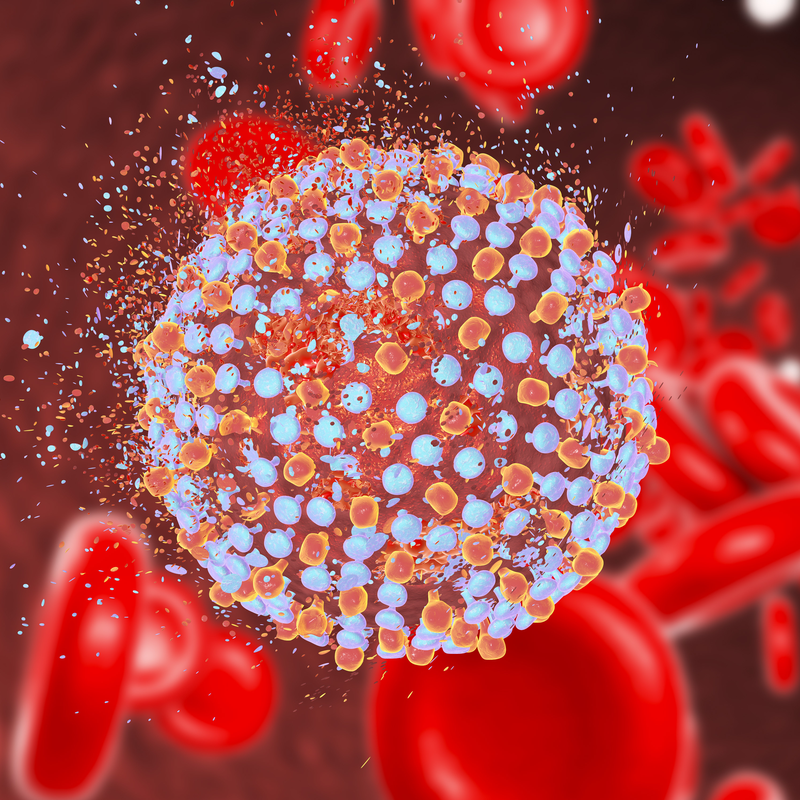
What is hepatitis type C - HCV virus?
Hepatitis C is a severe form of liver inflammation that is triggered by the so-called hepatitis type C - HCV virus. The virus is spread all over the world and is mainly passed on through the blood. In the acute disease, there are rarely or hardly any symptoms. However, the acute hepatitis C often develops into a chronic one. Hepatitis C is called chronic if HCV RNA is detectable in the patient for longer than 6 months .
How is the hepatitis type C - HCV virus transmitted?
The main route of transmission is contaminated blood. For this reason, the main cause of infection with the hepatitis C virus is also drug use. By sharing syringes, spoons or needles, drug users very easily infect each other. However, sharing sniffing tubes when using cocaine is also a source of danger as the virus is also transmitted via the mucous membranes.
Medical staff, such as orderlies, doctors or nurses, who have contact with patients infected with hepatitis C are exposed to an increased risk of infection. Professionals who come into contact with specimen material can easily become infected, for example, if they prick themselves with a needle that has been contaminated by the blood of the affected person.
When donating blood or receiving blood from others, there is no relevant risk of infection because all blood products are tested for the virus. The transmission through other body fluids such as sweat, tears, saliva or sperm is hardly possible. However, it must be said in principle that there is definitely an increased risk during certain sexual practices, for example when blood is involved , as the virus can be transmitted via injuries to the mucous membranes.
A mother can pass the virus on to her child, depending on the viral load in the mother's blood. Transmission via blood is also possible during birth. However, the risk is only about three to ten percent.
When does the hepatitis type C - HCV virus break out and how long is one contagious?
The incubation period, i.e. the time between infection and the appearance of the first symptoms, is about two to 24 weeks. On average, however, it is six to nine weeks. Basically, you are contagious for as long as the genetic material of the virus can be detected in your blood.
What are the symptoms of hepatitis type C - HCV virus?
In approx. 75 % of cases, there are no symptoms or only vague symptoms, which are usually similar to those of influenza. These include:
- Tiredness and fatigue,
- Nausea,
- Loss of appetite,
- Muscle aches and joint pain,
- Fever.
Approximately 25 % of those affected have an acute liver inflammation, which is mild in most cases. It is particularly noticeable through jaundice, i.e. yellowing of the skin, mucous membranes and eyes . Pain in the right upper abdomen is also possible. If the acute form of the infection turns into a chronic one, this is also mild for the most part, but symptoms such as reduced performance, fatigue and tiredness appear. In some cases, chronic hepatitis C leads to joint pain, itching and swelling of the lymph nodes. But there are other diseases that are associated with chronic hepatitis C in .
These include above all
- Diabetes mellitus,
- Depression,
- Hashimoto's thyroiditis,
- Sjögren's syndrome.
How is the hepatitis type C - HCV virus diagnosed?
After taking the medical history, i.e. the anamnesis, the doctor will arrange for a laboratory examination of the blood for the corresponding antibodies and liver values, such as COT and CPT, if hepatitis C is suspected, in order to be able to make a definite diagnosis.
How is hepatitis type C - HCV virus treated?
In about 50% of patients, hepatitis C cures on its own within several weeks. In certain cases, however, rapid use of special antivirally active drugs is necessary, for example in the case of doctors or nurses who have become infected through a needlestick injury. In the case of chronic hepatitis C , antivirals are also used to treat severe concomitant diseases and complaints. However, antiviral drugs are primarily the treatment of choice when chronic hepatitis C is present, because the aim of these drugs is to prevent the liver disease from progressing further. This ultimately also reduces the risk of late complications such as liver cirrhosis and liver cancer.
What is the prognosis for an infection with the hepatitis type C - HCV virus?
The first question that arises here; "Is hepatitis C curable?" The answer to this is, "In very many cases, yes." In about 15 to 45 % of patients, hepatitis C even cures spontaneously, i.e. without any therapy. However, in 55-85 % of those affected, a chronic hepatitis C develops. The course of the disease is also usually mild and does not have any specific symptoms. But in these cases, a spontaneous cure can rarely be observed. However, the correct type of treatment for chronic hepatitis C can certainly lead to the desired success, i.e. no viruses are detectable in the blood any more. Towards the end of the treatment, this is checked by means of a control examination. Unlike other forms of hepatitis, the hepatitis type C - HCV virus does not leave behind any lifelong protection, i.e. it is possible to become infected with the virus again.
How can you protect yourself against the hepatitis type C - HCV virus?
There is no vaccination against hepatitis C yet, so the following protection options exist:
- Drug users should not share injecting equipment or sniffing tubes with each other,
- Sexual intercourse should always take place with a condom, especially with frequently changing sexual partners,
- Nurses and doctors should always wear gloves when taking blood samples, treating wounds, etc.
